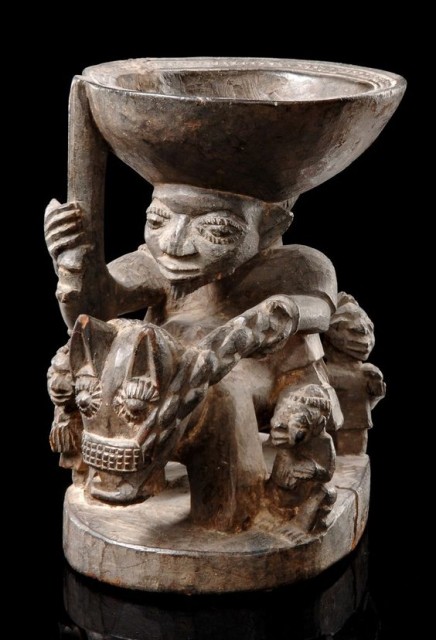Divination and Oracles
Throughout much of Africa people turn to divination for guidance in resolving their troubles. The act of divination involves advice, an explanation, or a prediction for the future—all of which are considered messages from the spiritual world. Many Christian and Muslim Africans do not see divination as conflicting with their faiths. Their approach to understanding life and solving its problems combines divination, religion, and other elements such as modern medicine.

Diviners and Their Methods
Diviners, the men and women who perform divination, are believed to be spokespersons for spiritual forces, including supernatural beings and the dead. Some people are selected at birth to become diviners; they may be descended from or related to other diviners. Other individuals are identified through religious or magical rituals or after recovering from a particular illness. Diviners are sometimes thought to have spiritual twins of the opposite sex. To bridge the gap between the earthly and spiritual worlds, a male diviner may dress in women's clothing or a female diviner in men's clothing.
Two main types of divination are practiced in Africa. Revelatory divination explains past misfortunes, and predictive divination foretells likely future events. Diviners rely on various methods, and some may use more than one technique.
Often diviners act as mediums, channels of communication between the earthly and spiritual worlds. This may involve entering a trance in which the diviner is thought to be taken over by a spirit or deity. The diviner then passes along or acts out a message. In southeastern Burkina Faso, for example, a spirit has no tongue but communicates through a diviner's hand gestures. Some spirit mediums are associated with the shrines of major African cults, such as the cult of Mwali in southeastern Africa and the cult of Ngombo in southern Democratic Republic of Congo and Angola. In other cases, a diviner may act as a medium without being possessed by a spirit. He or she may enter a trance and, upon waking, tell of a vision or a journey into the spirit world.
Dreams can be viewed as forms of divination. The TUAREG of North Africa believe that the spirits of the dead roam near graves and sometimes carry news to the living. To obtain a vision of the future, a person may sleep on a grave.
Diviners often interpret physical signs as spiritual messages. Among the Dogon people of Mali, for example, diviners trace a grid or set of lines in the dust outside the village at sunset. Over it they sprinkle grain to attract the pale fox, an animal that moves about by night. The following morning, the diviners read messages in the fox's tracks across the grid. Other diviners keep items in a special basket, bag, or cup. These items include seeds, insects, and parts of animals or birds. Manufactured objects that are important in daily life or associated with myths and symbols may also be used. The diviner observes the movement or arrangement of these items and interprets it to provide the message.
Purposes of Divination
People consult a diviner to discover the causes of a misfortune such as a difficult conflict, a disaster, a great loss, a mysterious illness, or even death. Divination is based on the idea that human relations can be the cause of such troubles. The diviner's message is expected to reveal the people or issues involved in the problem and to restore peace of mind. It may suggest a course of action.
A type of divination called an oracle may be used to determine guilt. In such cases, the diviner calls on an invisible force to arrange or move special items, such as horns, rattles, or gourds. The diviner might also poison a fowl, ask a series of yes-or-no questions, and interpret the movements of the fowl as answers to those questions. Sometimes the diviner will ask spirits or recently dead members of the community to respond to the questions of the oracle.
A diviner claims to be neutral in the process of divination, merely an instrument through which the spirits speak. His or her interpretations are respected. Oracles generally reinforce public opinion and the beliefs, values, and morals of the society. At the same time, they may reveal feelings of envy and an underlying power struggle within the community. Most traditions of divination operate at the level of family or community and have little to do with politics. In some cases, however, divination clearly serves to support political authority. (See also Religion and Ritual, Spirit Possession, Witchcraft and Sorcery.)